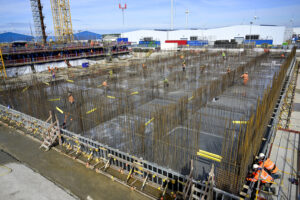The high-voltage grid operator, Elia, has defended the relevance of the Princess Elisabeth Energy Island project in parliament, despite the additional costs that could push up the project's final price tag.
A few hours after the announcement that British energy regulator Ofgem had given the green light to the Nautilus project - the first hybrid interconnection between the United Kingdom and Belgium - the Chamber's Committee on Energy discussed the issue of the North Sea energy island project.
The project, to be located some 45km off the coast of Belgium, is supposed to guarantee 30% of Belgium's energy supply through wind power and interconnections with other countries.
Price tag jumped from €2.2 to €7-8 billion in three years
However, its cost, initially estimated at €2.2 billion in 2021, has since rocketed, with the latest estimates putting the figure at €7 to €8 billion.
Elia CEO Frédéric Dunon declined to confirm this range, due to ongoing "contractual negotiations" with suppliers and the "confidentiality" this requires, but he did acknowledge "a significant increase in costs."
This is due, on one hand, to much higher raw material prices and and wage costs, but also "to market effects," linked mainly to shortages on the equipment supply market, according to Elia.
Lower costs than most other scenarios
Despite the additional costs, the project remains relevant, Elia argued.
Listing the expected benefits of the energy island, the operator noted that it would help decarbonise energy production (+3.5 GW of offshore wind power), reduce CO2 emissions, improve the security of supply, and even put downward pressure on electricity prices.
Elia officials also stressed that, despite the additional costs, the North Sea energy island solution remained competitive compared to most of the other scenarios on the table, with the exception of the extension of certain nuclear power stations combined with the construction of a thermal power station.
"However, it's not a question of ‘either-or’ but of ‘and-and,’" said Dunon, for whom the transition to low-carbon energy production will necessarily involve an “energy mix.”
No impact on rates expected before 2027
Officials from energy sector regulator CREG explained that they were carrying out several analyses of the project, looking at its cost, its impact on consumer rates and its benefits, as well as an analysis at the European level.
The regulator also expressed surprise at some of the figures put forward by Elia, which it was hearing for the first time.
CREG expects the project to have an impact on rates, but especially after the current rate period, 2024-2027.
For Elia, the maximum impact on grid users will be felt in 2032.

